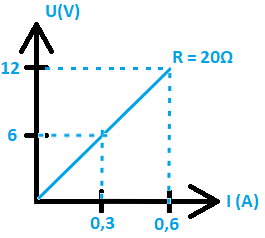The Proportion Game










Formula:
Quantity A:
Quantity B:
Proportionality coefficient C:
Level 1 : At the Supermarket
At the supermarket, quantity A represents a number of: 🍅, 🍌, 🍆 or 🍓.
Quantity B represents the number of coins "🟡" needed to buy quantity A.
Quantity C is the proportionality coefficient.
For example, if A is the number of 🍆:
The proportion C is:
- The number of 🍆 per "🟡" coin
- or the number of 🍆 for one "🟡" coin.
For example, if I have 6🍆 with 2🟡,
I also have 3🍆 with 1🟡, or 3🍆 per 🟡, which means the proportion is C = 3.
Quantities A, B, and C are related by the formula: A = B x C
This game has 6 levels and is designed to help you master the concept of proportion.
Level 5 : Graphical Representation of a Proportion
Ohm's Law U = R x I can be represented by a line passing through the origin:

- X-axis: U values
- Y-axis: I values
- The slope (or gradient) of the line equals the value of R
For example, here R = 20 Ω
We can verify it: R = U / I
=> R = 12 / 0.6 = 20 Ω or R = 6 / 0.3 = 20 Ω
At level 4, you will be given 6 random graphs of proportional physical quantities
The challenge is to find the only correct graph! 😱
Level 1 : At the Supermarket
Level 5 : Find the correct graph
Level 3: Formulas and Proportions
In Ohm's law: U = R x I
- U and I are proportional
- R is the proportionality coefficient
Imagine that the value of the resistance R doubles and the value of the current I remains constant, how does U evolve?
Another example with v = d / t (velocity formula)
- Since v = d / t
- t is in the denominator
- The larger t, the smaller v
- If t is multiplied by 2 (x2)
- v is divided by 2 (/2)
- Conclusion: The velocity v is divided by 2 (/2)
Level 3: Formulas and Proportions
Level 4: Formulas and Proportions (Part 2)
At level 4, the values of 2 quantities are multiplied or divided by 2, 4, or 8
It's up to you to find out how the 3rd quantity evolves! 😱
Let's take the example of Ohm's law: U = R x I
How does I evolve if U is multiplied by 4 and R is multiplied by 8?
Resistance R: multiplied by 8
Current I: ?
Voltage U: multiplied by 4
- Literal expression of I: I = U/R
- If U is multiplied by 4 => I is multiplied by 4
- R is in the denominator so if R is multiplied by 8 => I is divided by 8
- Conclusion I is divided by 2
Level 4: Formulas and Proportions (Part 2)

